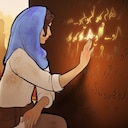Install Steam
login
|
language
简体中文 (Simplified Chinese)
繁體中文 (Traditional Chinese)
日本語 (Japanese)
한국어 (Korean)
ไทย (Thai)
Български (Bulgarian)
Čeština (Czech)
Dansk (Danish)
Deutsch (German)
Español - España (Spanish - Spain)
Español - Latinoamérica (Spanish - Latin America)
Ελληνικά (Greek)
Français (French)
Italiano (Italian)
Bahasa Indonesia (Indonesian)
Magyar (Hungarian)
Nederlands (Dutch)
Norsk (Norwegian)
Polski (Polish)
Português (Portuguese - Portugal)
Português - Brasil (Portuguese - Brazil)
Română (Romanian)
Русский (Russian)
Suomi (Finnish)
Svenska (Swedish)
Türkçe (Turkish)
Tiếng Việt (Vietnamese)
Українська (Ukrainian)
Report a translation problem























• There is a character for past tense as well. It comes right after the verb marker.
• There is also an "x" marker for negation. Like with the genitive (i.e. possessive, but a little broader, linguistically speaking), negated words are counted separately, so even though you might have "will", you might not yet have "will-not".
• If you forget which marker is which, the (concrete) noun marker means "thing", and the verb marker means "do".
• If you see a shape resembling a "?", that is likely an interrogative word such as "what".
• The numbering system is multiplicative: two number glyphs directly next to each other mean "multiply these numbers". In addition, the "|°" glyph means "raised to the power of" in the context of numbers. The low squiggly line, which means "and", can be used for addition if necessary.